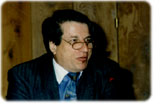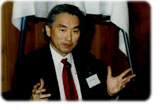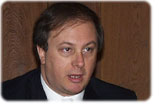Conference, September 8-10, 1999
Schloß Höchst, Frankfurt a.M., Germany
Mission | Program | Summary
Participants | Paper | Webcam
Documentation
|
Conference, September 8-10, 1999 Schloß Höchst, Frankfurt a.M., Germany Mission | Program | Summary Participants | Paper | Webcam Documentation |
|||||
| |
Executive Summary The 1999 Aventis Triangle Forum initiated a high-level discussion among leaders from Europe, North America and Asia on issues of the global future. Building on the foundations laid by several input task forces (download a summary of the events as a PDF file), the Forum's forty-two participants addressed three important themes:
 The Method The conference brought together leaders in order to define priorities and options for shaping the future of our societies. The CAP decided to address interlocking problems by confronting experts in a wide variety of fields with broad questions about the global future. In addition to presentations in their areas of expertise, technologists contributed views on social questions, social scientists addressed the impact of technology, business leaders added to the discussion on values, and government members spoke on how to resolve these questions. Their answers, and the dialogue that followed, provide a guide to the key items on today's global agenda. Introduction  Opening
the Forum, Hoechst Chief Executive Officer Jürgen
Dormann posed an overarching question, "How do we want to live tomorrow?"
He then outlined several challenges for future societies to cope with: the
consequences of rising life expectancies, the need for sustainable food
production, and the importance of affordable medical care. Although every
modern society's equilibrium is constantly in motion, leaders must still
point the way to a sustainable future. Opening
the Forum, Hoechst Chief Executive Officer Jürgen
Dormann posed an overarching question, "How do we want to live tomorrow?"
He then outlined several challenges for future societies to cope with: the
consequences of rising life expectancies, the need for sustainable food
production, and the importance of affordable medical care. Although every
modern society's equilibrium is constantly in motion, leaders must still
point the way to a sustainable future.Professor Werner Weidenfeld, Director of the Center for Applied Policy Research structured the discussion by calling on the participants to bring their diverse experience and expertise into a common focus. In a global setting characterized by change and innovation, ways must be found to compensate for new difficultues, and to preserve existing benefits. Governance In the first panel, Governor Boris Y. Nemtsov, Professor Benjamin Barber and Ronnie C. Chan tackled the problems facing all governments dealing with an increasingly diverse era. Governor Nemtsov highlighted the hope of the 'glasnost generation' and the real freedoms that Russians had gained since the collapse of communism.  Professor Barber laid down five challenges that followed from economic globalization:
Mr. Chan pointed out that the handover of Macau to China in December of this year will mark the end colonialism in Asia, but that simultaneously Asia is merging into the West: all significant global institutions originated in the West, there are no credible alternatives to Western approaches. This could lead to a lack of legitimacy for these institutions and practices in Asia, a situation that would harm all parties involved. Pax Americana may be preferable to any other, but that does not guarantee smooth sailing. In the discussion that followed, Prof. Shlomo Avineri expressed concern about tensions rising along the border between high-tech and low-tech societies. Dr. Sarasin Viraphol said that the challenge to Asia from the West is in many ways parallel to the challenge at the end of the nineteenth century, and that many younger people actively welcome the 'cultural invasion.' Eckard Polzer pointed out that, for all its influence, business is not interested in changing the world, but in making a profit. He added that just a few years ago, the Asian model was being held up as an example for the rest of the world and suspects that the current worries are overdone. Josef Janning asked how do we understand the public sphere for the future? The ability of our public institutions to respond does not seem to match our ability to gain knowledge. We need to rebuild the public sphere. Technology  Professors
Michio Kaku and Ernst-Ludwig
Winnacker accented different aspects of advancing questions. Kaku's
presentation offered an inspiring tour of the digital future, to the
not distant time when the power of a Pentium chip is available for a penny,
but where increases in computer power run up against the limits of silicon
atoms between 2015 and 2020. In the networked world, losers include: nation-states,
commodity makers, middlemen, war, small businesses, and people on fixed
income. Winners include: nations that invest in education, artists and entertainers,
and personal services. Winnacker pointed
out that the biotech revolution is starting to happen around us. Science
is building a better mouse; 10% of the pharmaceutical market already comes
from drugs derived from genetic engineering. He pointed out some important
ethical questions: Professors
Michio Kaku and Ernst-Ludwig
Winnacker accented different aspects of advancing questions. Kaku's
presentation offered an inspiring tour of the digital future, to the
not distant time when the power of a Pentium chip is available for a penny,
but where increases in computer power run up against the limits of silicon
atoms between 2015 and 2020. In the networked world, losers include: nation-states,
commodity makers, middlemen, war, small businesses, and people on fixed
income. Winners include: nations that invest in education, artists and entertainers,
and personal services. Winnacker pointed
out that the biotech revolution is starting to happen around us. Science
is building a better mouse; 10% of the pharmaceutical market already comes
from drugs derived from genetic engineering. He pointed out some important
ethical questions:
John Browning asked when the genetic technology is as self-evident as electricity? Genetic selection will probably make us more normal, but we will also probably find that our ideas of normality are actually very varied. One problem, though, is that we still have limited tolerance for other peoples' views of normality. Closing the discussion, Professor Kaku said that in ten years we would come back and say that all our predictions had been so conservative. Actions  Dr. William Drake proposed ten steps to take now in four areas mostly related to the computer and telecommunications sector. I. Internet Governance
Mr. Zulkifli Baharudin added many more key points in his presentation.
Dr. Maritta Koch-Weser put forward five specific action areas.
 Prof.
Duckhwan Lee warned that biology was in danger
of repeating chemistry's mistakes at the end of the nineteenth century,
when it promised great improvements but neglected the interactions between
humans and the rest of the planet. Prof. Kriengsak
Chareonwongsak asked the Forum to systematically target decision makers
with recommendations, said that education was in need of a near-total overhaul,
and that we should be careful to watch for the essence of democracy, rather
than just settling for its form. Prof.
Duckhwan Lee warned that biology was in danger
of repeating chemistry's mistakes at the end of the nineteenth century,
when it promised great improvements but neglected the interactions between
humans and the rest of the planet. Prof. Kriengsak
Chareonwongsak asked the Forum to systematically target decision makers
with recommendations, said that education was in need of a near-total overhaul,
and that we should be careful to watch for the essence of democracy, rather
than just settling for its form. |
||||
Project Background | Events | Reports and Essays Zukunftszeugen | Contact Us | Home Page Last Modified: 2002-04-23 TOP |
|||||